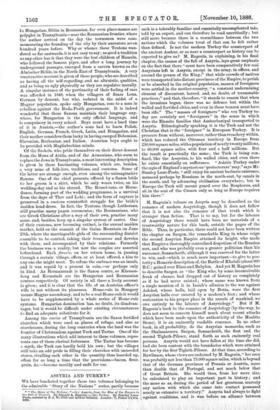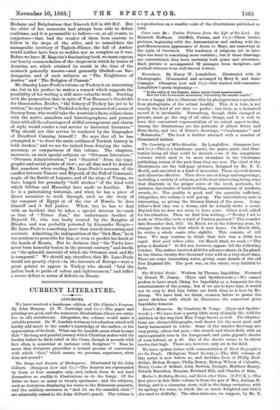ASSYRIA AND TURKEY.* WE have bracketed together these two volumes
belonging to the admirable "Story of the Nations" series, partly because
• n The Story of the Nations :"—(1.) Assyria, from the Else of the Empire to the Fan of Nineveh. By Unaide A. Ragozin—(2j Turkey. By Stanley Lane- Poole, assisted by E. 7. W. Gibb and Arthur Gillman. London : T. Fisher Unirin. 1888.
each is a tolerably familiar and essentially uncomplicated tale, told by an expert, and can therefore be read uncritically ; but still more because there is a resemblance between the two nations which the volumes treat of that can be felt rather than defined. Is not the modern Turkey the counterpart of the ancient Asshur, or as near a counterpart as history can be expected to give us? M. Ragozin, in explaining, in his final chapter, the causes of the fall of Assyria, lays great emphasis on the fact that there "must have been comparatively few real Assyrians left in Assyria, except in the army, in offices, and around the person of the King ;" that while crowds of natives were transported into distant provinces of the Empire, to perish or be absorbed in the original population, masses of foreigners were settled in the mother-country, "a constant undermining element of discontent, hatred, and, no doubt, of treasonable practices ;" and that, therefore, "it stands to reason that when the invasions began, there was no defence but within the walled and fortified cities, and even in these treason must have been rife." The "masses of foreigners" who vex Turkey to- day are certainly not " foreigners " in the sense in which were the Elamite families that Asshurbanips1 transported to Assyria. Ethnologically speaking, it is the 'Park and not the Christian that is the " foreigner " in European Turkey. It is pressure from without, moreover, rather than treachery within, which has reduced the Ottoman territory in Europe from 230,000 square miles, with a population of nearly twenty millions, to 66,000 square miles, with four and a half millions. But the result is practically the same ; the Turk is being con- fined, like the Assyrian, to his walled cities, and even there he exists essentially on sufferance. "Asiatic Turkey under the iegis of England's mysterious 'protectorate' may," says Mr. Stanley Lane-Poole, "still enjoy its ancient barbaric existence, menaced perhaps by Russians in the north-east, by canals in the south, and by advancing civilisation everywhere; but in Europe the Turk will mount guard over the Bosphorus, and sit in the seat of the Ca3stirs only so long as Europe requires him there."
M. Ragozin's volume on Assyria may be described as the romance of modern Assyriology, though it does not follow that it is not also the romance of that truth which is stranger than fiction. That is to say, but for the labours of Assyriology there would have been no materials of a trustworthy nature for this book, outside the pages of the Bible. Thus, in particular, there could not have been written the chapter on Sargon, the remarkable King in whose reign the second Assyrian Empire attained its height, who made that Empire a thoroughly centralised despotism of the Russian sort, and who was probably even a greater politician than his successor, Sennacherib, although it was reserved for the latter to win, and—which is much more important—to give to pos- terity a Homeric description of, the Battle of Khaluli (about 690 B.C.) gained over Elam and Babylon. And yet M. Ragozin has to describe Sargon as "the King who, by some inconceivable freak of chance, had dropped out of history as completely as if he had never existed; whose name was known from a single mention of it in Isaiah's allusion to the war against Ashdod, whose halls, laid open by Botta, were the first Assyrian halls ever entered by a modern's foot ; and whose restoration to his proper place in the annals of mankind, we owe entirely to the labours of Assyriology." But if M. Ragozin's book be the romance of Assyriology (by-the-way, he does not seem to concern himself much about recent attacks which have been made upon the authenticity of the Moabite Stone), it is an eminently readable romance. In no other book, in all probability, do the Assyrian monarchs, such as the Shalmanesers, Sargon, Sennacherib, the first and the second Tiglath-Pileser, stand forth as such eminently real persons. Assyria would not have fallen at the time she did, had she been content with the boundaries which were attained for her by the first Tiglath-Pileser. At that time, according to Rawlinson, whose views are endorsed by M. Ragozin, "her area was probably not less than 75,000 square miles, which is beyond that of the German provinces of Prussia or Austria, more than double that of Portugal, and not much below that of Great Britain. She would thus, from her mere size, be calculated to play an important part in history ; and the more so as, during the period of her greatness, scarcely any nation with which she came into contact possessed nearly so extensive a territory." Assyria had always to fight against coalitions, and it was before an alliance between Medians and Babylonians that Nineveh fell in 606 B.C. But the abler of her monarchs had always been able to defeat coalitions, and it is permissible to believe—or, at all events, to conjecture that, had the weaker of them been content to follow in the steps of the abler, and to consolidate the manageable territory of Tiglath-Pileser, the fall of .Aashur would neither have been so sudden -nor so complete as it was. Before we leave M. Raeozin's fascinating book, we must express our hearty commendation of the chapterain which he treats of Assyrian art, which attained its zenith in the time of the monarch generally known—and generally libelled—As Sar- danapalus, and of such subjects as " The Neighbours of ' Asshur " and "The Religion of Canaan."
Mr. Stanley-Lane-Poole's volume on Turkey is an interesting one, but in his preface he makes a remark which suggests the possibility of his writing a still more valuable work. Starting with the proposition that, in spite of Von Hammer's Geschichte des Osmanischen Belches, "the history of Turkey has yet to be written," he says 'that " aTurkish scholar, possessed of a sense of literary form, who would take the Austrian's facts, collate them with the native annalists and historiographers, and present them with all the advantages of skilful arrangement and charm of style, would render a real service to historical literature." Why should not this service be rendered by the biographer of Stratford Canning himself ? He says that all he has attempted is "to draw the main outlines of Turkish history in bold strokes," and we are far indeed from denying the value, accuracy, or compactness of this volume. The chapters, moreover, on such special subjects as "Ottoman Literature," "Ottoman Administration," and " Stambol " (from the topo- graphic and social points of view), are all that need be desired. But somehow, when reading Mr. Lane-Poole's account of the conflict between Timour and Bayezid, of the Fall of Constanti- nople, of the Battle of Lepanto, and of the siege of Vienna, we have longed for genuinely "bold strokes" of the kind with which Gibbon and Macaulay have made us familiar. But he is a painstaking historian, and when he has a piece of direct narrative to work through, such as the story of the conquest of Egypt or of the rise of Russia, he does himself and it full justice. When, too, he has to deal with an incident that he takes a special interest in—such as that of "Prince Jem," the unfortunate brother of Bayezid IL, who was badly treated by the Knights of Rhodes, and was probably poisoned by Alexander Borgia— Mr. Lane-Poole is something more than merely interesting and accurate. Admitting the indisposition of the "Sick Man," he is too cautious to prescribe for him, or even to predict his death at the hands of Russia. But he declares that "the Turks have never been honestly beaten in the present century," and dwells on "the splendid material of which the Ottoman rank and file is composed." We should say, therefore, that Mr. Lane-Poole -would not greatly object—in the interests of Europe—were a great patriot to appear in Turkey who should "lead the nation back to paths of valour and righteousness," and inflict a severe defeat or series of defeats on Russia.







































 Previous page
Previous page